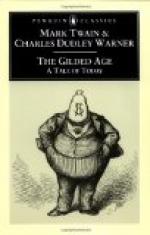The jury were risibly affected. Half the court room was in tears. If a vote of both spectators and jury could have been taken then, the verdict would have been, “let her go, she has suffered enough.”
But the district attorney had the closing argument. Calmly and without malice or excitement he reviewed the testimony. As the cold facts were unrolled, fear settled upon the listeners. There was no escape from the murder or its premeditation. Laura’s character as a lobbyist in Washington which had been made to appear incidentally in the evidence was also against her: the whole body of the testimony of the defense was shown to be irrelevant, introduced only to excite sympathy, and not giving a color of probability to the absurd supposition of insanity. The attorney then dwelt upon, the insecurity of life in the city, and the growing immunity with which women committed murders. Mr. McFlinn made a very able speech; convincing the reason without touching the feelings.
The Judge in his charge reviewed the, testimony with great show of impartiality. He ended by saying that the verdict must be acquittal or murder in the first, degree. If you find that the prisoner committed a homicide, in possession of her reason and with premeditation, your verdict will be accordingly. If you find she was not in her right mind, that she was the victim of insanity, hereditary or momentary, as it has been explained, your verdict will take that into account.
As the Judge finished his charge, the spectators anxiously watched the faces of the jury. It was not a remunerative study. In the court room the general feeling was in favor of Laura, but whether this feeling extended to the jury, their stolid faces did not reveal. The public outside hoped for a conviction, as it always does; it wanted an example; the newspapers trusted the jury would have the courage to do its duty. When Laura was convicted, then the public would tern around and abuse the governor if he did; not pardon her.
The jury went out. Mr. Braham preserved his serene confidence, but Laura’s friends were dispirited. Washington and Col. Sellers had been obliged to go to Washington, and they had departed under the unspoken fear the verdict would be unfavorable, a disagreement was the best they could hope for, and money was needed. The necessity of the passage of the University bill was now imperative.




